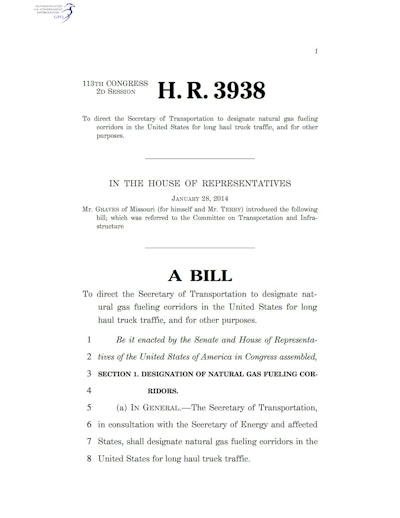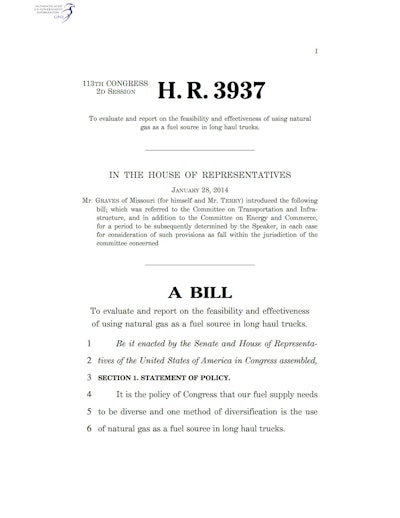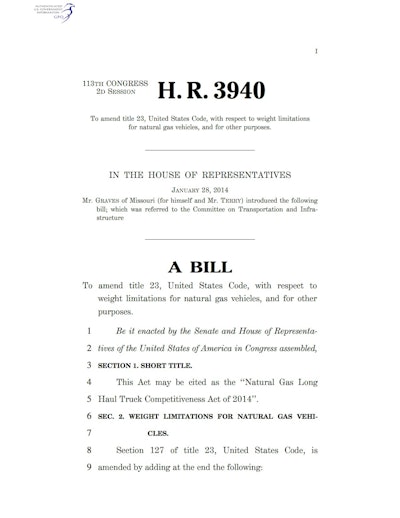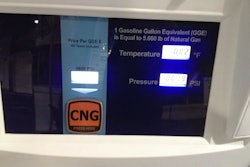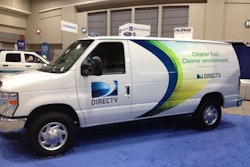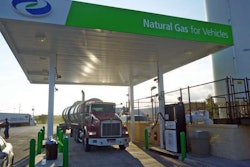Though I’m generally not in the camp that thinks government action on an issue is inherently an overreach and unnecessarily bureaucratic, after digging into the recent bills introduced in the House aimed at boosting natural gas use in trucking, particularly H.R. 3937 and H.R. 3938, I have to ask: What’s the point?
We all know the general talking points on natural gas — It’s an American fuel that could break our dependence on foreign oil if it became mainstream, it’s clean (save for the fracking debate) and it could save fleets lots of cash if the price differential holds.
With the way this Congress acts — which is to say, hardly at all — demand for natural gas along heavily traveled corridors would probably beat any public policy to the punch in getting fueling stations built.
So I present a few questions about the bills — ones that I’ll try to find answers to soon:
What would the task force (directed to be formed by H.R. 39387) uncover that’s not already being discussed in the public forum?
After its report is produced, what’s next? More legislation?
And lastly, are the findings in the report going to change the minds of any fleet owners or equipment buyers in the industry?
We reported on CCJ a few weeks ago on the three bills introduced in late January. They’re designed to promote natural gas use in long-haul trucking by (a) determining what barriers exist to transitioning to nat gas, (b) pushing the DOT to find potential so-called natural gas corridors and (c) giving natural gas trucks a weight exemption for the weight of the tank and fuel.
I read through each bill today — not a big task, since two of them are just two pages long and the other is three pages long — and they seem fairly straightforward, though the only one that would do anything concrete as far as natural gas promotion goes is H.R. 3940, the one that grants the weight exemption.
The other two do more abstract promotion, directing some study on natural gas and two reports on findings, though are dubious as to exactly what the accomplishments should or could be.
As previously reported, H.R. 3938, if passed, would direct the Secretary of Transportation, along with help from the Secretary of Energy to “designate natural gas fueling corridors in the U.S. for long haul truck traffic.”
Not previously reported, however, are specifics on what that actually means. Looking at the bill, its intentions are only slightly clearer: The DOT should find the highways where the most long-haul trucks run and work to get some nat gas fueling stations within 200 miles of each other along them.
The DOT’s tasks, per the bill:
“(1) seek to establish an interconnection of natural gas fueling stations across the United States that will serve the highest possible volume of long haul truck traffic.
(2) take into consideration the location of existing natural gas fueling stations, with the goal of having natural gas fueling stations located not greater than 200 miles apart in such corridors.”
Missing from the bill, though, are seemingly two key elements: How many corridors the DOT should designate and how the stations would come about.
More specifically, how Congress or the DOT could “establish” (to use the bill’s text) private sector fueling stations is unclear, unless the DOT plans to venture into the natural gas business.
The text of H.R. 3937 is also interesting, though also not really direct in promoting natural gas conversion in long-haul trucking. In a nutshell, it requires the formation of a task force — as directed by the Secretary of Transportation — to consider all aspects of natural gas implementation in trucking.
The task force would be made up of representatives from the Department of Energy, the Environmental Protection Agency, the Department of Commerce, members of Congress, state governments and reps from the private sector.
They would collaborate to discuss the following, per the bill:
- Barriers that prevent those in long-haul trucking from transitioning to natural gas
- Environmental benefits of using nat gas
- Other benefits and drawbacks to using natural gas
- The price difference between diesel trucks and natural gas trucks
- General concerns of the task force in using nat gas in long-haul operations
- The effect of natural gas implementation on the U.S.’ Highway Trust Fund
The task force would be required to produce a report on its findings within 120 days.
Maybe the pieces of legislation will spur some analytical thought by all involved and good talk to determine just what the societal benefits of an industry transition to nat gas would be — or whether it’s even worth pushing hard for it to happen sooner than it would have otherwise.
Either way, promoting talk seems to be all they’ll do.
Click here to see CCJ‘s original coverage of the bills.
Click the thumbs below to see the corresponding bill:
